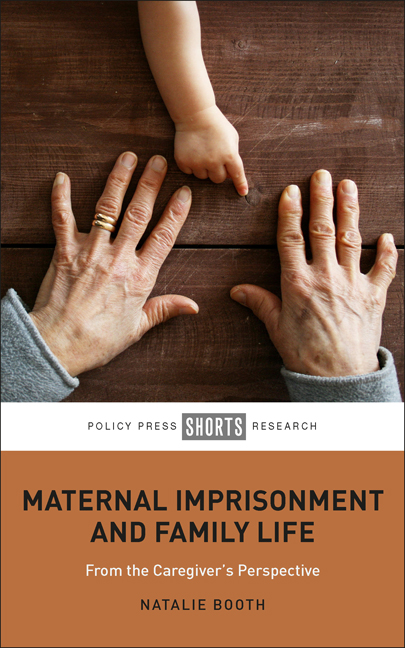Book contents
- Frontmatter
- Contents
- List of Tables
- Acknowledgements
- Preface: Linda’s Story
- One The Landscape of Maternal Imprisonment: Caregiving and Family Life
- Two Researching the Caregiver’S Lived Experiences
- Three Family Constructions and Caregiving Practices
- Four Renegotiating Family Life: Caregiving in the Aftermath of the Mother’S Imprisonment
- Five Navigating the Criminal Justice System
- Six Social Support, Familial Stigma and Release
- Seven Kin Caregiving: Occupying a Disenfranchised Status While Serving the Family Sentence
- Eight Reflections on the Research Process
- References
- Index
Four - Renegotiating Family Life: Caregiving in the Aftermath of the Mother’S Imprisonment
Published online by Cambridge University Press: 10 March 2021
- Frontmatter
- Contents
- List of Tables
- Acknowledgements
- Preface: Linda’s Story
- One The Landscape of Maternal Imprisonment: Caregiving and Family Life
- Two Researching the Caregiver’S Lived Experiences
- Three Family Constructions and Caregiving Practices
- Four Renegotiating Family Life: Caregiving in the Aftermath of the Mother’S Imprisonment
- Five Navigating the Criminal Justice System
- Six Social Support, Familial Stigma and Release
- Seven Kin Caregiving: Occupying a Disenfranchised Status While Serving the Family Sentence
- Eight Reflections on the Research Process
- References
- Index
Summary
Introduction
This chapter reveals how caregivers responded to the mother's imprisonment both in the short and long term. The focus is directed more towards the primary kin caregivers as the ones assuming the bulk of the childcare responsibilities. The literature provides some insights into the disruption that looking after the children can have for caregivers (Hairston, 2009; Raikes, 2016) but this chapter takes a chronological examination to help better understand the process of assuming care. While doing so, it is important to remember that in 14 families, an added layer of uncertainty and confusion occurred because it was their first time navigating maternal imprisonment. Renegotiations at three stages are examined:
Caregivers’ reactions to the news of the imprisonment and especially how the mother's sentence was unexpected. Caregivers felt bereaved through the sudden loss and separation from the mother.
The initial response to the mother's imprisonment: why and how? Details of the various changes and tasks that were undertaken in the initial weeks of the sentence and in the context of having made few caregiving preparations are examined.
The longer-term renegotiations, focusing on the diverse and complex adjustments made to their roles, identities, practices, work commitments and finances in order to provide care to the children on a more permanent basis.
News of the imprisonment
Research suggests that mothers (Masson, 2019) and caregivers looking after female prisoners’ children (Boswell and Wood, 2011) had not anticipated the outcome of a prison sentence. Similarly, the mother's imprisonment was not expected in 11 families in this study. This meant that the news of the prison sentence came as a shock, which had serious implications for their ability to prepare and respond to their new caretaking responsibilities. This section explores why the custodial sentence was unexpected and the caregivers’ thoughts and feelings about the initial period of separation from the mother.
The unexpected sentence: guilty
All the caregivers knew about the mother's court hearing before it took place but most reported that they had not expected the mother to actually receive a custodial sentence (see Chapter Four).
- Type
- Chapter
- Information
- Maternal Imprisonment and Family LifeFrom the Caregiver's Perspective, pp. 67 - 96Publisher: Bristol University PressPrint publication year: 2020

